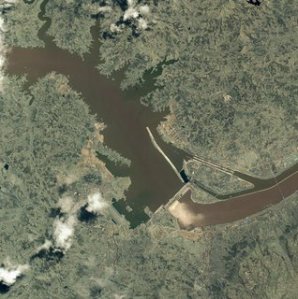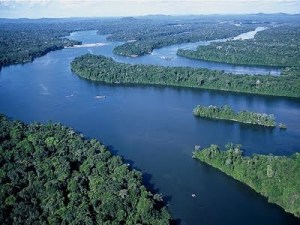About a week ago the builders of the highly controversial Belo Monte hydroelectric dam in Brazil were ordered to halt construction. I have some joy in my heart now, as I was devastated about a year ago when I heard the dam was given the go-ahead. Dams, often seen as a clean and green source of energy as compared to fossil fuels, are incredibly destructive – not only do they flood vast landscapes, they displace people as well. More often than not, it is indigenous people that are displaced, and more often than not they are told to move without any consultation. To add insult to injury, the dams often do not even provide secure economic benefits.

The Old Man River Dam, in Southern Alberta
I am familiar with a handful of damming projects – in Alberta, where I’m from, the biggest and most controversial dam was the Old Man River Dam, which did get built despite recommendations from the Environmental Assessment Panel of the Federal Environmental Assessment Review Office that the dam should be decommissioned. This recommendation was not just based off of concerns for natural conservation, or social justice for the Peigan Indian Band – an economic assessment showed that the dam would provide no net benefit to the region, and energy and irrigation needs could be met though other less harmful means. The fact that the dam was built anyways in the early 90’s lead some to believe there were ulterior motives – namely an interbasin water transfer scheme that would direct water from Alberta to the USA (a prohibited activity). I am not sure about current conditions of the dam or the Peigan people.

The Chico River, with the terraced fields of the indigenous Igorot people
The other damming project I have some knowledge of is the Chico Dam project in the Philippines – (most of my opinions originate from this article in ecologist magazine) which is often seen as a successful resistance to inappropriate political and corporate interests. The dam was proposed as a means to aid in Philippines energy independence, but investigation showed that improved energy efficiency processes would be a more effective way of meeting needs. Injustice and inequity were problems inherent to the planning of the dam – as benefits of the dam would certainly not go to the indigenous people (the Igorots), or even the local Philippine economy. The electricity and irrigation generated by the dam were slated to go to transnational industrial corporations that had sugar cane plantations in the Philippines, and thus money would be leaving the country at the expense of the Philippine people and environment. Now, violence ensued, as many of the indigenous groups were warrior peoples, but an upwelling of community support and alliances saw their goal out: the Chico Dam Project has been suspended indefinitely.

The Three Gorges Dam - the largest dam in the world
The Three Gorges Dam in China (the largest dam in the world – the filling of which caused the Earth to tremble on its axis) is an extreme example of how wrong it can go – this past summer the dam was not even able to operate at optimal capacity due to a drought. A heart wrenching failure, especially since the sacrifice was millions of people tearing down their own homes to relocate. It has become clear that the estimate for efficiency of the Belo Monte would be similarly bleak – the dam would only be operating 4 months per year. So, in conclusion, I rejoiced the halting of a dam being built on the fragile Xingu river in Brazil, because in my mind the results are not only regrettable, they are irreversible. Perhaps one day we will come to realize that a river is worth far more than just the water that is flowing between its banks.

Read Full Post »





